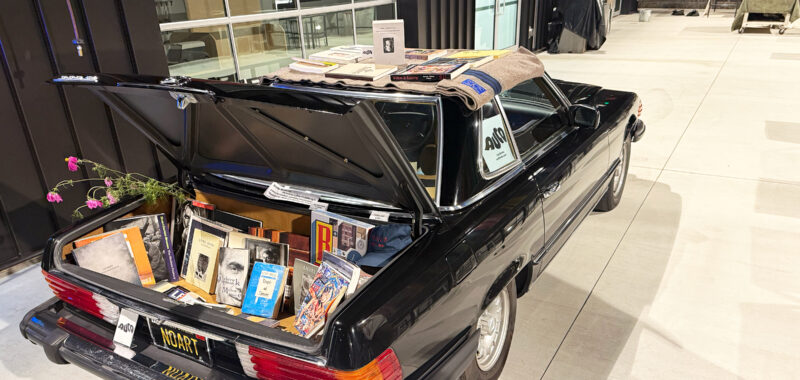LOS ANGELES — Books offer the contradictions of intimacy and communal experience. They represent the specific characteristics of the people and places that created them, but can be easily and affordably shared with a global audience. (It’s no surprise that one of the first things authoritarian regimes do is ban, or burn, books.)
The latest edition of Printed Matter’s Los Angeles Art Book Fair, running through this Sunday, May 18, channels this meaningful dichotomy. The annual event recently relocated from its previous home in the massive warehouse space of the Geffen Contemporary at the Museum of Contemporary Art, Los Angeles, to a labyrinth of smaller rooms spread between two buildings on the Pasadena campus of the ArtCenter College of Design. A large selection of the more than 300 exhibitors from around the world use letterpress, risograph, or Xerox machines to produce an array of printed matter running the gamut from the personal to the political, from limited edition art books to mass-produced pamphlets.

W.e.g.m.g (We Eat Good My Guy) from Whitter, California, exemplified this hyperlocal spirit with photobooks, zines, stickers, and pins. Inspired by a scene of two baseball players bumping crotches after a successful play, publisher Sifry M. Borrayo created a T-shirt bearing the Dodgers logo with a Tom of Finland drawing of two leather-clad hunks in a similar pose — a quintessentially LA mashup.
At Secret Headquarters, Carly Jean Andrews was hawking her new spiral-bound book, THE DOME Throat Heart Mouth Earth. Combining photographs, found images, and hand-drawn text, the self-portraits draw on airbrushed van paintings and fantasy novel illustrations, channeling the hedonism of 1970s post-hippie Los Angeles. (Fittingly, each book comes with a screen-printed thong.)


On view at falgoush, a publishing and curatorial project exploring Iranian identity, was Door to Door (2024) by Mohammad Rezaei, a photo journey of mundane doorways in Tehran, where he grew up. The San Francisco-based imprint StreetSalad brought Some Taco Trucks by publisher Tron Martinez, a sly send-up of Ed Ruscha’s photographic typologies featuring taco vendors along the route from Richmond to San Bruno.
StreetSalad also reprinted significant Chicanx and Latinx art books, such as Galería de la Raza’s Coloring Book, Jose Montoya’s Pachuco Art (1977), and a catalogue for the 1975 exhibition Chicanismo el en Arte, held at East LA College and then at the Los Angeles County Museum of Art. This points to another important role that many small publishers have taken on, of digging into the archives and restoring lesser-told histories, preventing them from being forgotten.


The Mattazine Society (a play on the pioneering LA-based gay rights organization, Mattachine Society), produces “old-school style fanzines about people who are on the edge of culture,” said founder Jose Tinoco — including Dennis Cooper, Cookie Mueller, Peter Hujar, and musician Kid Congo Powers. Each issue is made with an analog cut-and-paste technique and photocopied, with a signature bright-yellow cover. Meanwhile, Emily Larned, who works under the imprints Impractical Labor (ILSSA) / Alder & Frankia, uses a letterpress and risograph to reprint works from feminist archives and document overlooked figures, such as activist and feminist theater director KD Codish, who brought a community-centered approach to policing at the New Haven Police Academy.

In marked contrast to this year’s Frieze New York fair, political themes were on view everywhere. Solidarity with Gaza was expressed in publications and posters across stands, as were links between various conflicts and movements around the world. Mexico City’s Miau Ediciones, focused on feminist publications and dissident authors and artists, posted a grid of printed sheets behind their table that referenced the United States–Mexico border, rising US autocracy, and trans rights: “No Border Can Hold Mi Amor,” “Golfo de México,” and “Protege the Muñecas.”
Also from Mexico City, Cráter Invertido is a multi-platform collective that brings together a publishing house, radio station, and printing press. Beyond simply producing their own books, the group stresses the importance of self-publishing in all its forms: “What matters is the gesture to publish what you want,” collective member Estefanía Palacios said, “with whatever medium you have.”

